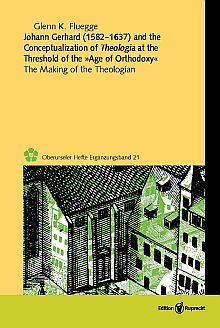Rezension
LOGIA, 29 (2020) vol. 1
Theology is commonly defined as »talk about God,« an etymological definition which even the Lutheran archtheologian Johann Gerhard did not spurn. But obviously there is more to say. After all, is the unregenerate classics professor »doing theology« when he lectures on the Greek New Testament, perhaps even somewhat accurately, yet without faith? Most of us sense that this is not exactly what we have in mind when we use the term theologia, even though it is at some level »talk about God.« Therefore, what is the relation of faith and piety to theology and the acquisition of theological knowledge (notitia)? If it is true that the way one defines theology will ultimately shape how he learns and teaches theology, then we must care-fully ask and answer the question: What is theology? In this book, Glenn Fluegge sees Johann Gerhard as uniquely positioned at a turning point in the history of theological education to give insight to the question. As Fluegge argues, Gerhard flourished before a major shift occurred that tended toward the professionalizing of theology into a group of distinct sciences and academic disciplines. Gerhard, in a sense, had one foot in the world of Luther, who emphasized the need for personal faith in the study of theology (as famously expressed through the triad: oratio, meditatio, tentatio) and one foot in what would become the world of modern university and seminary theological education.
Drawing on the thinking and controversies of his time, Gerhard was careful to define theology as a habitus practicus Θε?δοτος (»a God-given, practical disposition«). In this publication and revision of his doctoral dissertation, Fluegge explores this somewhat enigmatic, yet wholistic definition of theology through a careful analysis of Gerhard's writings, including insights from his Theological Commonplaces and Method of Theological Study.
Luther himself was understandably wary of using the Aristotelian term habitus (»a having,« »disposition«) to describe theology. Luther, unlike Melanchthon, saw too much room for works-righteousness in this term with its long philosophical history. This later occasioned some controversy over the use of habitus to describe theology. Gerhard shared Luther's concerns, but ultimately he did not think that one had to be hopelessly Aristotelean by the use of this term. By adopting the qualifier (»God-given«) Gerhard eliminated any hint of synergism, and by calling it »mostly practical« removed any notion that theology could be separated from faith and piety (including any so-called »theology of the un-regenerate«).
It is difficult to navigate the fine line between theology as faith and theology as a discipline. Fleugge shows how difficult the task was and how well Gerhard did at such a pivotal time. A testimony to the staying-power of Gerhard's definition is its continual use even to this day by confessional Lutherans both in seminary classrooms (usually drawing on the works of Walther and Pieper) and in more modern writers of pastoral theologies (such as Harold Senkbeil). Perhaps the greater testimony, however, is the man himself, Johann Gerhard, who was not merely a dogmatician, nor merely a preacher, or a church superintendent, or a devotional writer and spiritual caregiver, but all of these together – a true theologian.
Any theological educator with the ability to navigate the technical terminology of the period and who desires a fuller understanding of this now-standard definition and its history will be aided by Fluegge’s well researched and clearly organized work.
Joshua J. Hayes







